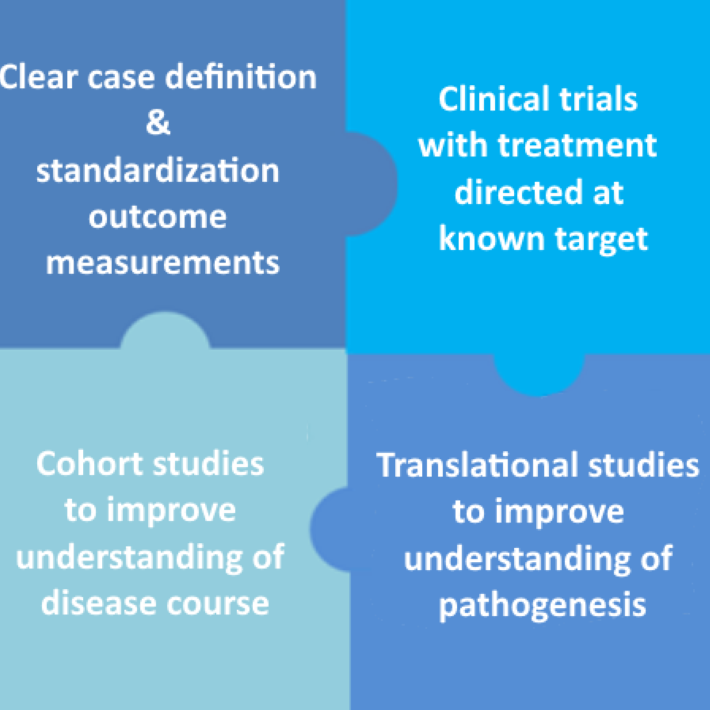Towards new treatments for osteoarthritis
&width=710&height=710)
In 1999 we initiated OA research within the Department of Rheumatology, LUMC.
The OA research program aims at two topics,
1) unraveling underlying pathways in development and progression of OA, and
2) optimization of methodology to measure OA symptoms and signs.
Our ultimate goal is to enable development of disease modifying drugs.
- In our research we focus on OA in the hands. Hand OA is highly prevent with great impact on patient lives. Unfortunately, within OA research this is a “forgotten disease”. Since 2019 the research group is supported as Research Center of Excellence Award for their work on osteoarthritis of the hands by the Dutch Arthritis Society.
- To increase our understanding of OA pathophysiology, we focus on the role of inflammation, locally in the synovium, and systemically, such as due to obesity and lipid metabolism. We are especially interested whether inflammation can be a target for treatment.
- We develop methodology for clear case definitions and optimal assessment of outcomes, which are crucial for performance of clinical trials and cohorts.
In 1999 we initiated OA research within the Department of Rheumatology, LUMC.
The OA research program aims at two topics,
1) unraveling underlying pathways in development and progression of OA, and
2) optimization of methodology to measure OA symptoms and signs.
Our ultimate goal is to enable development of disease modifying drugs.
- In our research we focus on OA in the hands. Hand OA is highly prevent with great impact on patient lives. Unfortunately, within OA research this is a “forgotten disease”. Since 2019 the research group is supported as Research Center of Excellence Award for their work on osteoarthritis of the hands by the Dutch Arthritis Society.
- To increase our understanding of OA pathophysiology, we focus on the role of inflammation, locally in the synovium, and systemically, such as due to obesity and lipid metabolism. We are especially interested whether inflammation can be a target for treatment.
- We develop methodology for clear case definitions and optimal assessment of outcomes, which are crucial for performance of clinical trials and cohorts.
Cohorts
Over the years several well-characterized cohorts of patients with OA in the hands, knees and multiple joints, including the GARP, Hostas, GemstOAn and ECHO cohorts, including over 900 patients, have been set-up and followed, enabling monitoring of symptoms and structural abnormalities. These cohorts enable research for development, validation and reliability testing of outcomes measures.
Clinical Trials
Investigator-initiated clinical trials, the EHOA and HOPE studies, in patients with hand OA have been set-up to investigate anti-inflammatory drugs.
Translational research
At the Rheumatology Research Laboratory In collaboration with the Center of Proteomics and Metabolomics of the LUMC translational studies have been set up to investigate the role of synovial and adipose tissue and lipid metabolism in OA.
Clinimetrics
In collaboration with OMERACT (Outcome Measures in Rheumatology) working groups core domains and optimal outcome measures are developed (Prof. Kloppenburg is co-chair of the hand OA working group). With a European Alliance of Associations for Rheumatology (EULAR) task force new classification criteria for hand OA are under development (prof. Kloppenburg is convenor).
Collaborations
The research group collaborates with national and international consortia, being CHECK (Cohort Hip & Cohort Knee) and APPROACH. Active contribution not only exists by inclusion of part of the patient population, but also in performance of clinical and translational research within these cohorts.
The research group actively collaborates with the department of Clinical Epidemiology of the LUMC in the NEO study to investigate the role of obesity on hand and knee OA.
With the Department of Endocrinology of the LUMC a collaboration exists to investigate the role of IGF-1 and growth hormone on OA development.
With the University of Leiden a clinical trial is set-up to investigate an eHealth program for patients with hand OA (GriponPain).